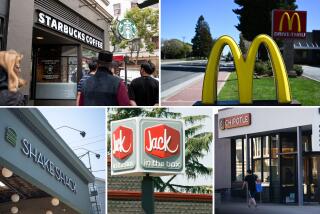Clone ruling expected to boost firms
When Cyagra Inc. holds an office potluck, no one’s stomach churns when the lasagna, meatloaf or tacos are made with cloned beef.
The cutting-edge ingredient was produced on the company’s Pennsylvania farm for the Food and Drug Administration, which spent seven years evaluating the safety of meat and milk from cloned animals and their offspring.
“We had leftovers,” so we used them, said Steve Mower, director of marketing for the Elizabethtown, Pa.-based company.
Cyagra is one of three privately held biotech start-ups making clones of genetically superior livestock for thousands of dollars apiece. In the coming years, they hope the rest of the U.S. -- and the world -- will join them in dining on steaks, pork chops and ice cream derived from animals conceived in their laboratories.
After reviewing hundreds of scientific studies, the FDA concluded last week that food produced from clones and their progeny is as safe to eat as conventional fare. The agency cleared the way for meat and milk from the offspring of cloned cattle, pigs and goats to be sold at grocery stores and restaurants without any special labeling. Food from the clones themselves is expected to follow after a transition period of unspecified length.
Though consumers are skeptical about this new culinary era, Cyagra, ViaGen Inc. and Trans Ova Genetics are enthusiastic. Some had bet the farm on FDA approval and were struggling to survive as the final decision was delayed to address concerns of consumer groups, the public and some members of Congress.
Over the next five years, the market for cloned animals in the U.S. is expected to reach nearly $50 million annually, according to industry analysts. After that, the figure could grow exponentially as cloning technology improves and more ranchers and farmers decide to make copies of their most valuable animals.
“Most of these guys have been living on venture capital and were waiting nervously for the FDA to make a decision,” said L. Val Giddings, a former official with the U.S. Department of Agriculture who now works as an animal science industry consultant. Now that it has, he said, the fledgling industry could finally see its first profits.
Analysts said the biggest winner probably would be industry leader ViaGen, which controls an estimated 75% of the market and recorded sales of $2.2 million in 2006.
The Austin, Texas-based company was founded in 2002 by genetics researchers at Texas A&M; University and backed by billionaire investor John Sperling, who made his fortune building the for-profit University of Phoenix. Sperling’s previous venture, Genetic Savings & Clone Inc., cloned five pet cats but closed in 2006 before it could clone his cherished hunting dog, Missy.
Mark Walton, ViaGen’s president, said the company took in modest revenue by cloning show horses for as much as $150,000 a piece, along with cows for $17,500 and pigs for $4,000. The company also offers an identification service known as AnguSure that uses DNA to verify the purity of Angus beef.
With FDA approval in hand, Walton predicted the company initially would be able to sell several hundred cloned cattle and pigs for ranchers and farmers each year, rising to 1,000 or more after the technology became more efficient and prices fell.
But like other experts in the field, he said cloning would be limited to the most elite animals whose genes are prized by breeders.
For instance, a rancher with a popular stud could boost his supply of bull semen by having the animal cloned. Because the clones are genetic twins of the original, vials of their semen would be just as hearty. After it was used to impregnate ordinary cows, the resulting offspring would be slaughtered for meat. In some cases, the clones themselves could wind up at the slaughterhouse when their stud days are over.
A few enterprising ranchers have already ordered clones and have vials of frozen semen ready to sell for the upcoming breeding season. But for the most part, it will take three to five years for the yet-to-be-born offspring of clones to make their way into the food chain in significant numbers.
“Even in our wildest fantasies, we’re not seeing more than 5% or 6%” of the cattle herd being clones, Walton said.
Cyagra and Trans Ova Genetics, which have struggled at times to attract outside investors, are also poised to profit from the FDA decision.
Cyagra produces about 60 clones a year, and Mower has said that the company could double or triple its output if the FDA gave the technology its seal of approval. The company wouldn’t disclose its revenue.
Trans Ova’s chief executive, David Faber, said he was confident his revenue would soon begin climbing, though he declined to disclose sales figures.
The Sioux Center, Iowa, company is focused on expanding its sales to livestock owners and breeders in the U.S.
Faber is also looking ahead to other markets that combine cloning with genetic engineering.
In 2003, Trans Ova began a joint venture with Hematech Inc. of Sioux Falls, S.D., which has created specialized cows that produce disease-fighting human antibodies in their milk. The goal is to extract the antibodies and purify them for use in biotech drugs.
Animal biotechnology researchers have endorsed the approach as an alternative to producing drugs in chicken eggs or living cells.
“Conceptually, it would be a lot cheaper to produce the drugs in animals,” said Alison Van Eenennaam, an animal geneticist at UC Davis.
Times staff writer Karen Kaplan contributed to this report.






